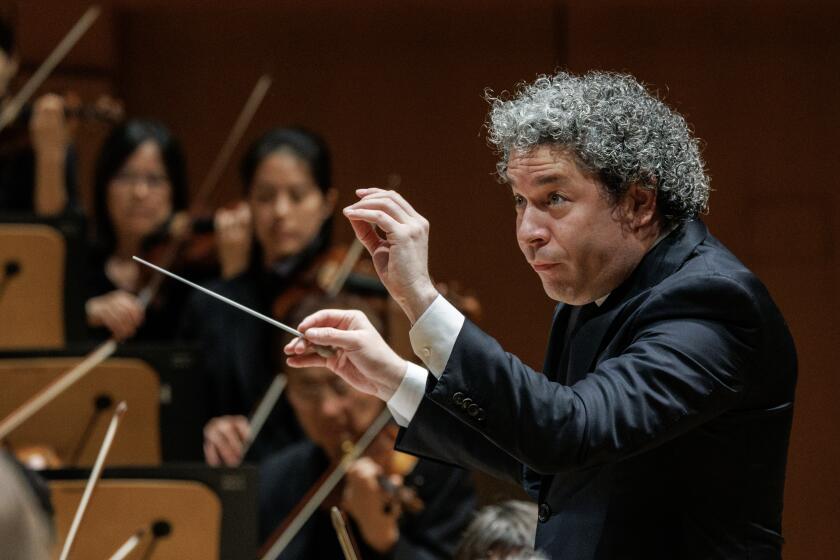The explosive musical storytelling of San Cha puts the Goth in ranchera
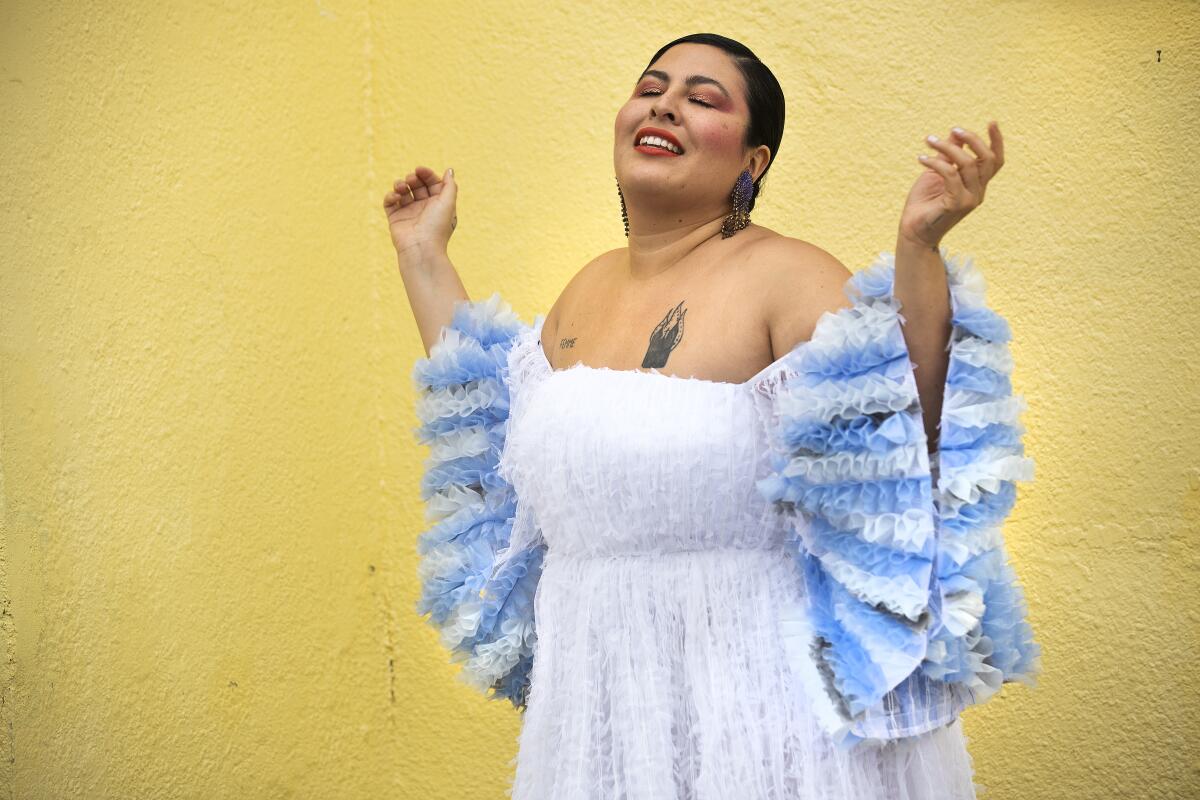
Before she could come up with a follow up to her debut album, and before her songs were featured on the Showtime series “Vida,” Lizette Anabelle Gutierrez thought about abandoning her career in the U.S. and fleeing to Mexico.
“I had all of these dreams that I would start teaching at a school and kind of run away from capitalism and stay with my aunt and be on the farm forever, teaching kids to play music,” the singer-songwriter better known as San Cha says while in quarantine at her current home in Highland Park.
At the time of her doubts, Gutierrez, now 32, was in her late 20s and living in the San Francisco Bay area. A first-generation daughter of Mexican immigrants, she grew up in San Jose but struggled to make enough money to eat every day. She shared a room to keep rent low and was on an endless grind, working and performing at drag events, dive bars and backyard parties. It was exhausting. She was distraught. “I was just running myself dry. I wasn’t happy. I was like, ‘This isn’t the life I want to be living, to just be burning myself out and not have anything in return.’”
So in the summer of 2015, she fled Northern California for Mexico, eventually landing in her aunt’s farm in Jalostotitlán, Jalisco. As she hoped, life there was simpler, serene. She hardly socialized — “which isn’t very much like me.” But she was eating well and spent the days with her aunt cooking, cleaning and watching novelas. She was happy just playing music for her family and teaching her younger cousins the guitar.
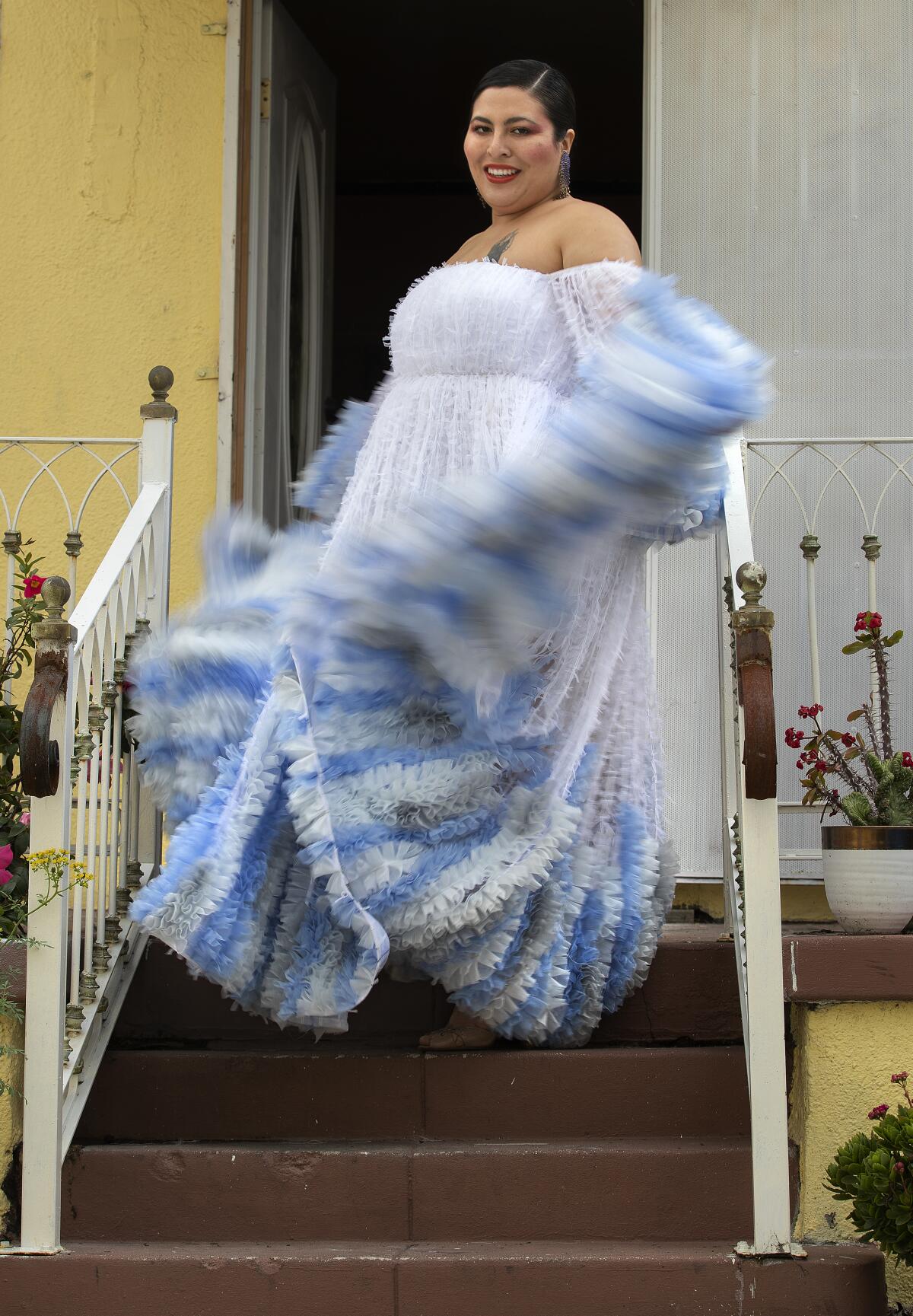
This is where she developed the concept for her 2019 album, “La Luz de la Esperanza.” Gutierrez — whose stage name San Cha is a play on the Spanish word “san,” meaning saint, and “sancha,” slang for mistress — grew to love ranchera music thanks to her aunt’s encouragement. In fact, ranchera came to forge the heart of her musical style.
“I love the romance. I love the suffering for romance, and the tragedy that comes with it,” she says about her love for Mexican folk songs. “It’s very much like a telenovela, like ‘Without you I won’t be able to breathe. I’ll drown in misery.’”
The drama, she says with a laugh, is “what I’m all about.”
It’s also what she finds delightfully appealing about telenovelas: The exaggerated melodrama. The vulnerability and over-the-top emotions. The devastation and perpetual heartache.
So she set out to write a ranchera telenovela of sorts. “La Luz de la Esperanza” was the spawn of that inspiration.
The telenovela album tells the tale of Dolores, a poor yet elegantly dressed domestic worker who falls in love with a rich man named Salvador. It’s the familiar rags-to-riches trope from Spanish soap operas (a theme that was important for her to highlight), but with a twist: rather than a happily-ever-after ending with her abusive beloved, Dolores finds true love with Esperanza, a genderless spirit that symbolizes hope. It’s a metaphor for San Cha’s self-discovery as a queer woman.

The album was a project she had been working on for about five years between releasing other music — including “Me Demandó — DEMOS” in 2016, which she wrote and recorded at the ranch where her mother grew up milking cows, and the 2018 goth-cumbia EP “Capricho del Diablo,” which was inspired by a toxic relationship with a mentor and was used several times during the second season of “Vida.” She also released the LP “Off Her Throne!” in 2013.
Her latest album is one that was loosely based on the 1994 Mexican telenovela “Marimar,” which starred the singer-actress Thalía. It’s a bilingual work that mingles contemporary rancheras and boleros with a gothic, rock edge. There are harmonies and operatic vocals, electronic and acoustic notes, throbbing bass lines and rock riffs, all which capture the euphoria of falling in love and the pits of heartache and tragedy. She’s described her music as “visceral and explosive.”
Linda “Nuves” Tovar, a local DJ and San Cha’s backup singer and percussionist, remembers the first time she saw Gutierrez perform about four years ago. “It filled me up with all these emotions that I didn’t know I could express on the dance floor or the pit,” she says over the phone.
On stage, San Cha radiates a message of “Yes I’m this glamorous person but I also have feelings. I also cry and scream. I also feel like something is possessing me.”

“It’s so nice to be able to witness all that range of emotions in her performances,” Tovar says. “It’s so inspiring to me, as someone who has always struggled with finding themselves, to see someone who lives fearlessly.”
In February 2019, San Cha brought her telenovela to life at Vibiana in downtown L.A. for the Red Bull Music Festival. The two-act novela featured a full band, backup singers and the elaborate costumes, sets and makeup she always imagined.
But it was a grind. She had two months to write 13 songs, rehearse them with a seven-piece band and get used to ear monitors, which no one playing with her had used before. The day before the show, her backup singers didn’t know where to stand on stage, and their choreographer wasn’t around to direct them.
“I literally thought I was going to fail,” she says, “and that everyone was going to laugh at me.”
But it all came together. “And I learned how fast I could write songs,” she says. “And that if I have an idea, if I have no doubts, I can make something happen.”
She’s “a big dreamer,” says Rafa Esparza, a visual artist from L.A. and a friend of San Cha’s. “The way that she manifests her work comes from these really elaborate dreams and these really ambitious ideas.”
And she’s not afraid to experiment or fuse her love for punk and ranchera music into one. “I think that mixture and the way that she embodies these different genres,” says Esparza, “it’s very queer and very brown and not very explored.”
San Cha has always had a rocky relationship with gender. She grew up in a Catholic, traditional Mexican household where “everything that I’ve been taught to do is how to be a good housewife,” she says. Education wasn’t valued in her family. “My mom’s dream for me was to be a secretary and to get married in a white dress.”
When she finally left home, she spent three years finding out who she was. Creativity guided her in that process.
San Cha says she was always “high-strung about” music. She pursued it from a young age, starting with the flute at age 10. At 12 she joined her church’s choir and at 13 she picked up a guitar for the first time, a small, nylon-stringed Yamaha that’s followed her along ever since. By the time she was about 16, she was leading a children and adult choir at church.
Still, her parents discouraged her musical aspirations. “My dad always told me that I’m not the daughter of a rich man so I don’t really deserve to be making music.”
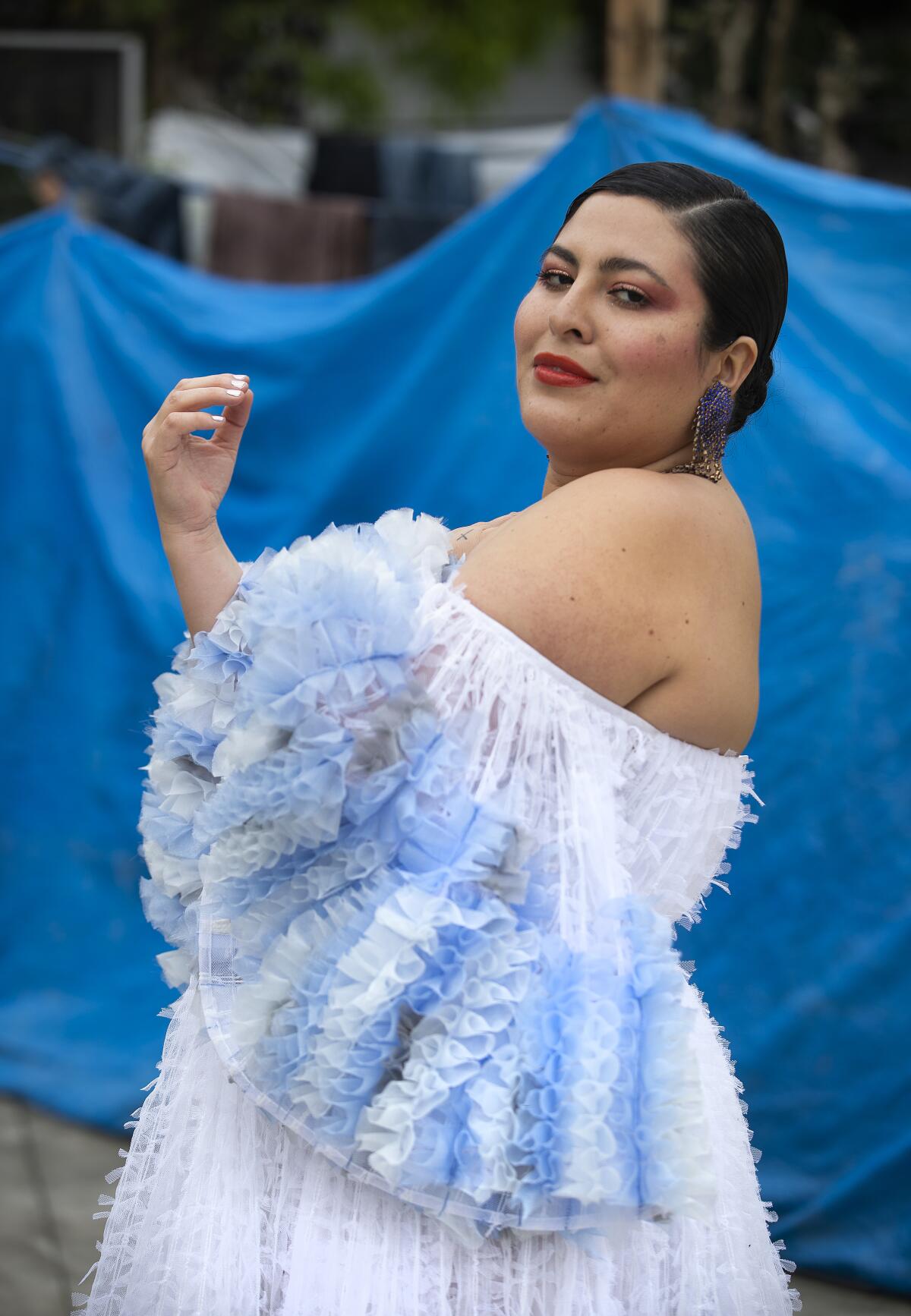
But she pursued it regardless, inspired by Latina luminaries including Chavela Vargas, Selena and Shakira, and the music of Jimi Hendrix, Janis Joplin and Billie Holiday, who expanded her musical horizons. “[Holiday] kind of changed my life and my trajectory in music.”
And it’s a life she’s currently happy with. She’s living her fantasy as a working musician. Her relationship with her parents has steadily improved. She shares a stable home with her partner and their lovebird Mango.
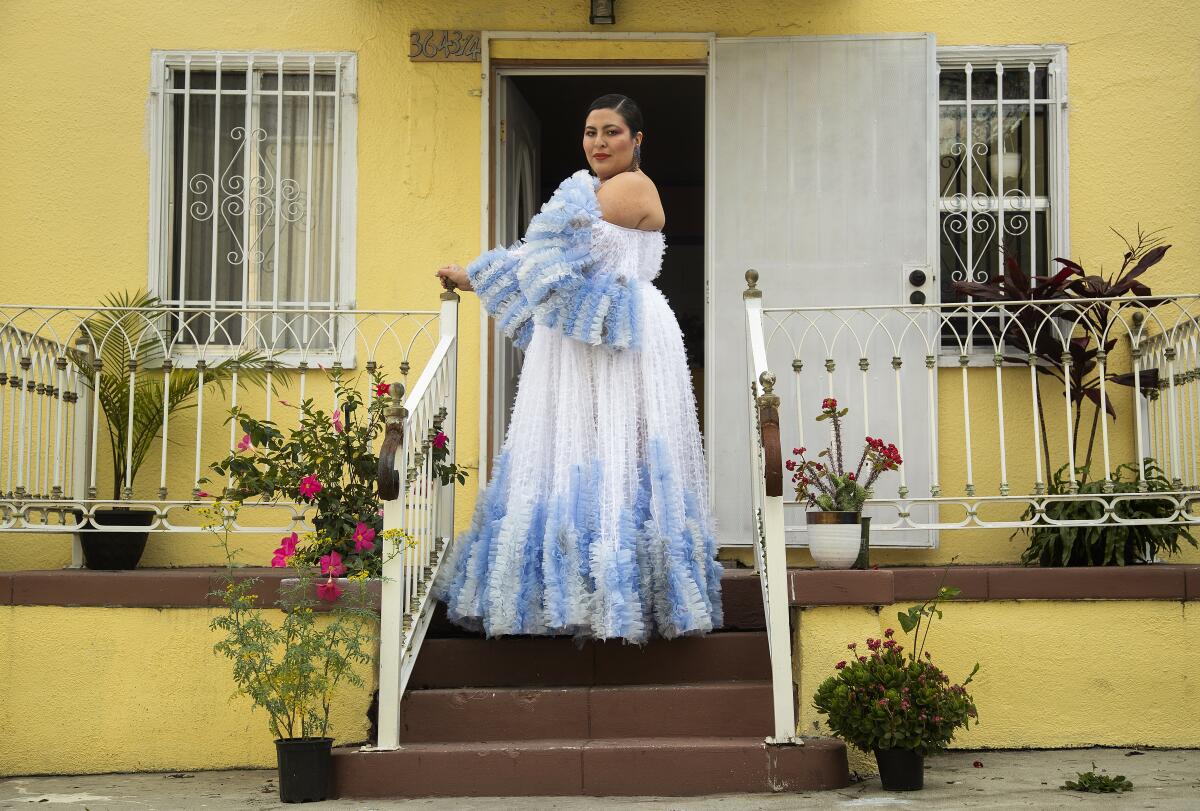
Her days in quarantine are spent writing “slowly”; watching TV shows (“Elite” and “Little Fires Everywhere”) and films from Mexico’s Golden Age of cinema (she’s collecting ideas for a film adaptation of “La Luz de la Esperanza”). She had booked a set of dates to tour the album with the band, but everything was canceled because of the pandemic. And so she’s cooking (“fried foods somehow feel really good right now” — gorditas are her favorite), practicing vocal warmups and playing music alone.
“I’ve been playing my guitar more, which I had kind of stopped doing,” she says, “because I play with a lot of musicians who are way better than me.”
Still, she misses not performing or practicing with her bandmates. “I miss that exchange of energy,” she says.
At the same time, she knows from experience that retreat can spark creativity. She may be hundreds of miles away from her aunt’s farm in Jalisco, yet it’s all but certain San Cha will emerge from quarantine with intoxicating music and bigger dreams.
More to Read
The biggest entertainment stories
Get our big stories about Hollywood, film, television, music, arts, culture and more right in your inbox as soon as they publish.
You may occasionally receive promotional content from the Los Angeles Times.







